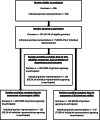Measurement of sustainment of prevention programs and initiatives: the sustainment measurement system scale
- PMID: 32883352
- PMCID: PMC7470441
- DOI: 10.1186/s13012-020-01030-x
Measurement of sustainment of prevention programs and initiatives: the sustainment measurement system scale
Abstract
Background: Enhancing the sustainability of evidence-based prevention programs for mental and behavioral health requires tools for measuring both sustainability determinants and sustainment outcomes. The aim of this study was to develop the Sustainment Measurement System Scale (SMSS) and to assess its reliability and construct validity for measuring both determinants and outcomes of efforts to sustain prevention programs and initiatives.
Methods: A 42-item scale comprised of items identified from qualitative data collected from 45 representatives of 10 programs and 8 SAMHSA program officers was administered to 186 representatives of 145 programs funded by 7 SAMHSA prevention grant initiatives. Cronbach's alphas were used to determine inter-item reliability. Convergent validity was assessed by comparisons of a global measure of sustainment with current SAMHSA-funding status and continued operation in the same form. Discriminant validity was assessed by comparisons of sustainability determinants with whether or not the program had undergone adaptations.
Results: Confirmatory factor analysis provided support for a 35-item model fit to the data. Cronbach's alpha was .84 for the sustainment outcome construct and ranged from .70 to .93 for the sustainability determinant constructs. All of the determinant constructs were significantly associated with sustainment outcome individual and global measures for the entire sample (p < 0.01 to 0.001) and for community-based programs and programs with a substance abuse focus (p < 0.05 to 0.001). Convergent validity was supported by significant associations between the global sustainment measure and current SAMHSA funding status and continued operation in the same form (p < 0.001). Four of the sustainability determinant constructs (responsive to community needs; coalitions, partnerships, and networks; organizational staff capability; and evaluation, feedback, and program outcomes) were also significantly associated with current SAMHSA funding status (p < 0.5 to 0.01). With the exception of organizational staff capability, all sustainability determinants were unrelated to program adaptation as predicted.
Conclusions: The SMSS demonstrated good reliability and convergent and discriminant validity in assessing likelihood of sustainment of SAMHSA funded prevention programs and initiatives. The measure demonstrates potential in identifying predictors of program sustainment and as a tool for enhancing the likelihood of successful sustainment through ongoing evaluation and feedback.
Keywords: Behavioral health; Measurement; Prevention; Sustainability; Sustainment.
Conflict of interest statement
All authors declare that they have no conflicts of interest.
Figures
References
Publication types
MeSH terms
Grants and funding
LinkOut - more resources
Full Text Sources
Medical


